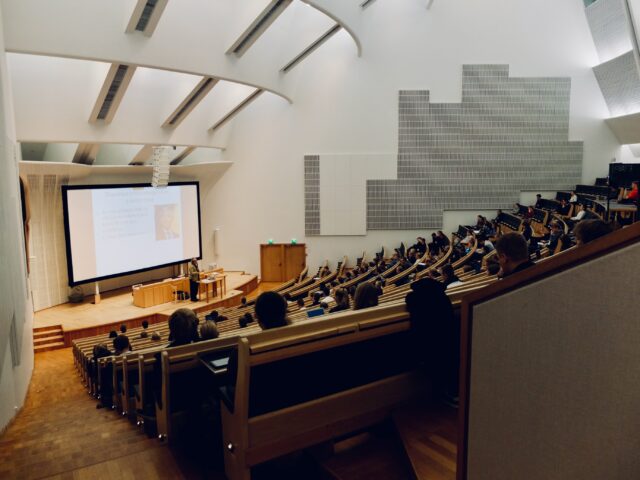The Government of Canada and Government of Quebec have announced a joint $41M investment to construct the Carrefour international Brian-Mulroney and the main building of the Institut nordique du Québec (INQ) at Université Laval. The Pavilion of the Carrefour international Brian-Mulroney will house the École supérieure d’études internationales (ESEI), which will train the next generation of Francophone diplomats and foreign service workers. ULaval’s INQ will support northern and arctic science research with a new complex that includes laboratories, a multifunctional room, and a broadcasting space.

Top Ten News
May 30, 2023
St Clair College has unveiled its new Early Childhood Education (ECE) Outdoor Lab at its Chatham campus. The ECE Outdoor Lab provides a space for faculty and students to explore best practices associated with outdoor pedagogy while contributing to local communities. St Clair ECE Professor Brenda Huff explains that the lab is part of the nationwide Outdoor Pedagogy ECE Faculty Research Project. “The involvement in the research project has rooted the new outdoor lab as a focal point for our ECE program by implementing key learnings from the research project,” said Huff. “Our ECE students gain core competencies as graduates by bringing research and practice closer together.”
Students at the University of Alberta’s new archaeology field school are exploring a historic Métis settlement site in St Albert, Alberta. The new field school is offered through the Department of Anthropology in partnership with UAlberta’s Institute of Prairie and Indigenous Archaeology (IPIA); the Arts and Heritage Foundation of St Albert; and the Métis Nation of Alberta, Local 1904. Students at the site are conducting hands-on research through excavations, drone surveys, and ground-penetrating radar. The program will operate into late June, after which time the ground will be restored to its original state as much as possible.
In a recent article for the Chronicle of Higher Ed, Beth McMurtrie discusses how instructors can navigate AI use to the benefit of students with disabilities. McMurtrie writes that AI tools can act as personal assistants for those who may find tasks such as time management and information processing difficult. However, assessment methods – which may change as professors work to prevent cheating using AI – could also hurt students who may find oral exams or in-class tests more difficult. The author discusses how instructors can encourage students to produce their own work as a way of growing and developing their skills and work with students with disabilities as they create policies on AI use.
College directors in Quebec are expressing concern about an addition to Bill 96 that would require international students to pass a French exit exam to graduate from some Attestation d’études collégiales (AEC) programs. AEC programs are short technical training programs that prepare students to enter the job market. CTV News reports that students in English programs will need to pass a standardized test to prove that they have reached “Level 7 in oral expression and comprehension” and “Level 4 in written expression and comprehension.” These requirements will come into effect for students who are starting programs in July. Vanier College director general John McMahon noted that the new requirements put an additional burden on students and that international students might choose to study in other provinces to avoid the language requirements.
Several postsecondary institutions recently announced new strategic partnerships. The University of New Brunswick’s Saint John campus recently signed a Memorandum of Understanding (MOU) with the Foreign Trade University (FTU) in Hanoi, Vietnam. Thanks to the agreement, participating students from FTU can complete the final two years of their Bachelor of Business Administration degrees at UNB. Sheridan College and the City of Mississauga signed an MOU with the aim of aligning Sheridan’s programming to the needs of the local economy. Other areas of focus include EDI, research and innovation, and city capacity building. Seneca Polytechnic committed to a formal framework agreement with the National Film Board of Canada. This partnership aims to increase opportunities for students interested in film animation.
The University of Manitoba’s Desautels Faculty of Music has received approval to offer a Micro-Certificate in Songmaking (MCS). MCS students will participate in experiential, hands-on learning and gain skills in areas such as song writing, audio production, and the music business. They will also have access to a network of industry professionals and mentors. The one-year program is set to launch in Fall 2023 for individuals 18 years or older and aims to reduce barriers by offering evening and weekend classes. “Through these experiences, they will develop the skills to grow in their music-making in bands or as songwriters while gaining insights into navigating the music business,” said Dean of the Desautels Faculty of Music Ed Jurkowski.
The Government of Nova Scotia has announced that it will cover the costs of the Meningitis B (MenB) vaccine for Nova Scotians deemed at high risk of contracting the disease. Starting this week, postsecondary students under age 25 who are living in dorms for the first time will be able to get both doses of the vaccine. “There’s substantive and sufficient evidence that this group and these very particular settings are at increased risk,” said NS Chief Medical Officer of Health Dr Robert Strang. “So it just makes sense that we now add them to that existing high-risk policy.”
Immigration, Refugees and Citizenship Canada (IRCC) has announced that applicants to the Student Direct Stream (SDS) will soon have four new language test options. Currently, the SDS only accepts IELTS General and IELTS Academic tests. However, starting in August 2023, eligible tests will include CELPIP General, CAEL, PTE Academic, and the TOEFL iBT Test. Applicants must demonstrate abilities in speaking, listening, reading, and writing, and applicants are required to complete the tests in person.
The Michener Institute has determined that it was recently the target of a cybersecurity incident. While online and in-person classes were not affected, a Michener news release reports that some online services experienced disruptions. The release affirms that the school took immediate action to secure and protect the network, consulted with external experts to investigate the incident, strengthened its processes and safeguards, and brought the system back up securely. Michener says that it is continuing to monitor the situation closely and is taking steps towards remediation.
